Graham Reid | | 5 min read
Pat Boone: Wish You Were here Buddy (1966)
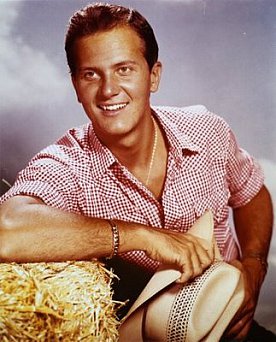
If conventional wisdom and the
rock'n'roll history books are to be believed, Pat Boone was one of
the villains - simply because he was so nice.
He was the square when his
contemporaries were the sneering, hip-swinging Elvis, the outrageous
Little Richard and the adult, knowing Chuck Berry.
Boone – who turned down a film role
early in his career because he would have had to kiss a woman who
wasn’t his wife – idolised Bing Crosby and adapted raw elemental
black music into the smooth style of the Old Groaner.
Boone’s bland and palatable
popularisation of rhythm and blues meant the music -- albeit in a
very diluted form – made it into conservative Middle American homes
it otherwise wouldn’t have reached. And plenty of them. He scored
an impressive 38 top 40 hits in America in the seven years to 1962
and sold more than 46 million records.
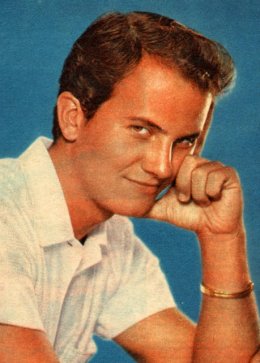 Rock historians might not like to admit
it but Pat Boone, with April Love, Love Letters in the Sand and the
like, rivalled Elvis for a while.
Rock historians might not like to admit
it but Pat Boone, with April Love, Love Letters in the Sand and the
like, rivalled Elvis for a while.
Growing up in Jacksonville, Florida, he
“dreamed of being a singer but the chance was practically nil
because we knew no one in the business,” says this affable but
still unashamedly morally and politically conservative 60-year-old.
“My mother was a nurse, my father a
building contractor, and I took a few piano lessons. I never learned
to read music but always sang because I was always willing and
confident of my ability to carry a tune."
He sang to business, church and civic
groups and won a talent quest which took him to New York, where he
won the final and went on to another professional talent show.
His first record was a hit and in 1955
he scored a number one with a pallid version of Fats Domino’s Ain't
that a Shame.
“I had just enrolled in Columbia
University in New York City and thought I was going to be a
schoolteacher. I was going to major in English and Randy Woods of Dot
Records wanted me to sing a song called Ain't that a Shame . . .
which was not good English! I tried to sing it as ‘Isn’t that a
shame’ but it just didn't work out."
And so began a career, first in music
later in film and television, which saw Boone – with his youthful,
college-boy looks and trademark “white bucks” (shoes) -- as the
acceptable face of the emergent postwar youth culture.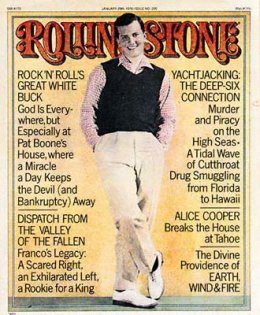
Boone today accepts he diluted
rock’n’roll to popularise it and in retrospect feels he has to
“take some of the blame or credit for helping rock'n'roll become an
accepted music form. Now that I look at where it’s gone I think
it’s more blame than credit.”
“I think some of the fears that
parents and preachers had about where rock'n'roll would take the
younger generation have become well founded, not so much then because
there was an innocence about rock 'n’ roll at the time.
"We’d clean up the lyrics - I
know I did - but the kids didn't care so much about the lyrics, they
just wanted the fun of the music. But then business people got very
much involved and found if they could encourage anarchistic
rebellious young people to write about taboo things that there would
be a lot of kids who would gravitate towards those things.
“The fellows in the ivory towers and
three-piece suits not only encouraged the writing of songs about
drugs and sex and all sorts of things but then they discovered they
could get the DJs to play them if they supplied them liberally with
drugs.
“The music business became pretty
corrupt.”
By that time, however, Boone was no
longer a force. His hits stopped coming, the Beatles arrived and a
new consciousness was abroad. Not one that he likes even today.
He understood the resentment many felt
about the Vietnam conflict but still believes civil disobedience and
burning draft cards was unacceptable.
“I think when we went into Vietnam it
was with some fairly lofty goals. We wanted to keep people from being
enslaved. We did have some economic interests there too. We never got
into an all-battle -- and it would have been an even more frightful
thing if we had, I guess.
“But I didn't agree with rebelling
against the Government, burning draft cards and all sorts of civil
disobedience.
“When I was of draft age for the
Korean War I conscientiously objected to training how to kill because
of my religious upbringing but I was willing to train to be a medic
and go on the front line and risk my life. But it would be to save
life, not take it.
"In the Sixties I wrote and
recorded Wish You Were Here, Buddy [included on this set] which was from the viewpoint of a
guy already in Vietnam in a foxhole or jungle and hearing about some
friend back home who was burning his draft card and taking part in
big demonstrations and thumbing his nose at the Government. I didn't
think that was the proper response.
“Our Government does allow us to
dissent. We don’t have to do something that we conscientiously
object to but we don’t have to bring down the Government either
just because we don’t agree with the policy.”
Today Boone says people are having to
choose their own paths and "I just hope those who choose to go a
productive way will finally -- and they do at this point -- outnumber
those who want to go, and maybe even conscientiously believe they are
right to go, in a non-constructive path.
“For instance there is a growing
number of people in America who think we were robbed when Congress
took prayer out of schools even if they wanted to have it
voluntarily. We were then flooded with drugs, guns, violence and
promiscuous sexuality and I think common sense tells you that when
there are deterrent influences you aren‘t going to have the rampant
involvement in destructive things.
“If you have kids who pray openly and
have some sort of moral reminder then the likelihood of getting
involved in things which fly in the face of that isn't nearly as
strong.”
As with Cliff Richard, Boone kept the
contract he undertook with his audience and never betrayed it.
He never claimed to be anything other than an upright, moral citizen and today – with charity work – he is still keeping his end of the bargain.
For another side of Pat Boone, the man in "a metal mood", have a listen to this.

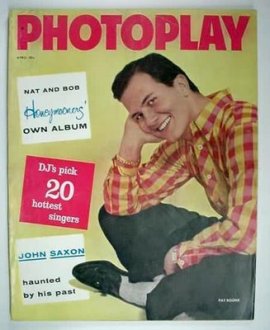

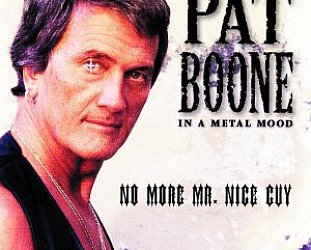
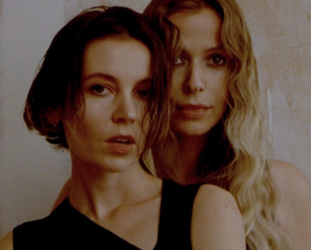
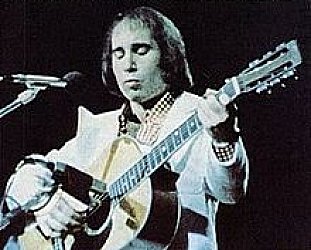
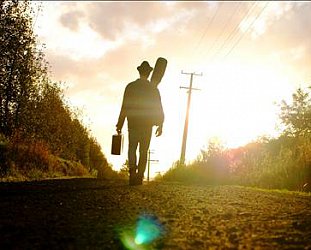
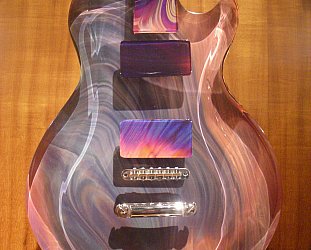
post a comment